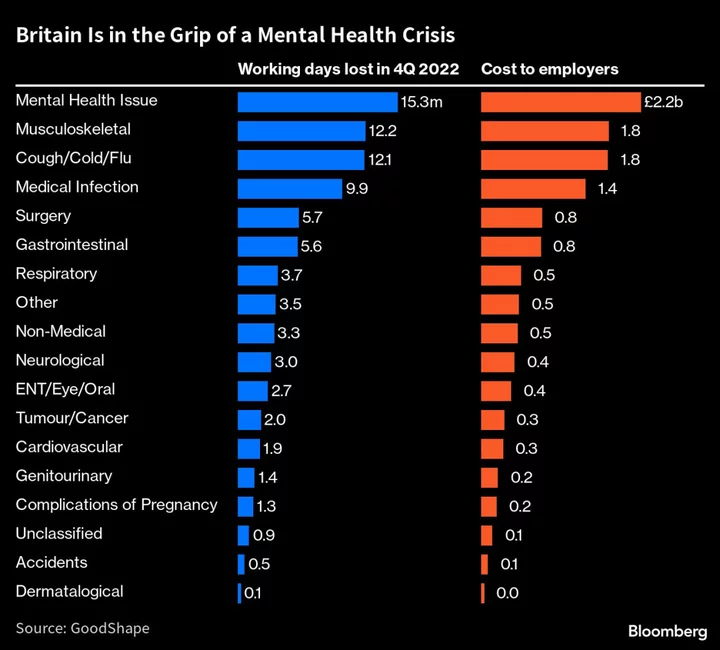Prime Minister Rishi Sunak is looking to reduce the ranks of Britons declared too sick to work and boost the economy by reforming the system of “fit notes” issued by doctors.
Options are being considered by the Department for Work and Pensions ahead of the Autumn Statement later this year, when Chancellor Jeremy Hunt is expected to announce a series of measures, according to people familiar with the matter.
Ministers are concerned about the current operation of fit notes, which are used by employees and those not working to support claims for financial assistance. Official statistics show 94% declare a patient “unfit to work” rather than recommending support in the workplace.
However, tacking the issue risks backfiring in the run-up to the general election if interpreted as the government trying to force sick people to work.
Sickness among those of working age is one of the most pressing economic issues facing the government. It’s created acute labor shortages that are holding back the economy, fueling inflation and adding pressure on the Bank of England to keep raising interest rates.
It’s also adding billions of pounds to the annual welfare bill, making it harder for Sunak to deliver the tax cuts many Conservatives insist are vital if the party is to retain power at the election, expected to be held next year.
Work and Pensions Secretary Mel Stride has said that getting the 650,000 people who left the workforce during the pandemic back into employment could boost the economy by enough to pay for a 2 pence cut in the basic rate of income tax. Less than half had returned as of April.
There are currently 8.7 million economically inactive 16 to 64-year olds in the UK — including a record 2.6 million who are long-term sick. Workforce participation has fallen more than any other Group of Seven nation, and none has seen such a sharp rise in those claiming to be too ill to work.
There are also many others who are taking time off work due to physical and mental ill health, costing employers billions of pounds.
Hunt made a start on breaking down barriers to work in his March budget, with measures to make childcare more affordable and bring older workers out of retirement. However, there is a sense that more needs to be done.
A government spokesperson said: “We are committed to working with the professional medical bodies to implement changes to improve the fit note and support better health and work conversations.”
Fit notes replaced the traditional “sick note” under Gordon Brown’s Labour government in 2010, with the aim of helping people return to work as soon as possible. Health care professionals have the option of declaring an individual as either “not fit for work” or “may be fit for work,” with adjustments that could allow a staggered or supported return to employment.
There are concerns within government that fit notes are too binary. A recommendation that someone may be fit for work is made in just 6% of cases, a figure that has got worse since the pandemic.
The concern is that once someone is signed off sick, they stay there for the long term. One minister said that this had particularly become an issue with mental health.
The aim of reform would be to encourage people to either stay in work with support or move back into work as soon as possible, signposting specific health care support and advice on how to do so.
But government advisers say there is lots of work that needs to be done to ensure these reforms are done safely.
(Adds government reaction)
Author: Leonora Campbell, Alex Wickham and Emily Ashton

